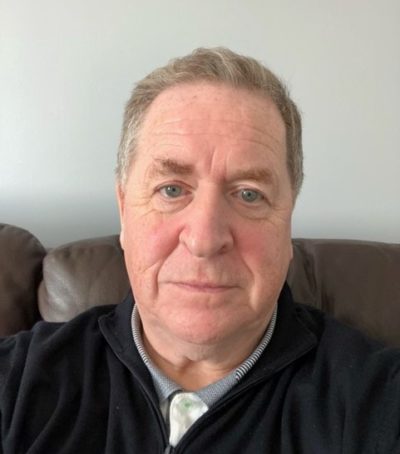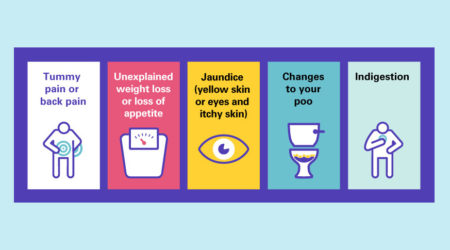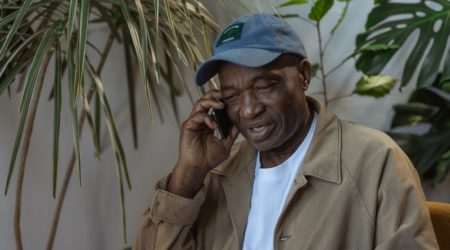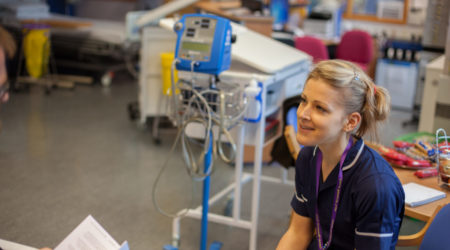

Robert
Robert went to his GP suffering from nausea and was quickly diagnosed with pancreatic cancer, aged 59. He talks about getting treatment and taking part in a clinical trial.
My story begins at the start of lockdown in March of 2020. I was working from home and had been feeling nauseated for about a week so I decided to contact my GP.
Having tests
After having a telephone consultation, I was asked to attend the surgery in person in order that they could take some blood and urine samples. I was told that I should phone in about 5 days for the results, which would have been a Friday or Saturday, so you can imagine my surprise when I was contacted on the Monday to advise that the results were showing poor liver function and that I was being referred with immediate effect to my local hospital.
I was admitted to hospital that afternoon in order that further tests could be carried out. It was clear that something was wrong as I was now showing early signs of jaundice. I was subjected to blood tests, an MRI scan and a CT scan. A few days later I was told that they wished to carry out an endoscopy as the results of the other tests were inconclusive. This was carried out within 48 hours and they advised they would take a biopsy if they found anything during the procedure.
Getting the news I had pancreatic cancer
A few days had passed when a junior doctor came in and pulled the curtains round me, little was I to know that my world was about to collapse. Bearing in mind that due to COVID no visitors were allowed in the hospital, I was told that they had found a mass at the head of my pancreas. I just went numb and broke down. Was I going to die? Could they do anything? Later that day I spoke with a consultant from the pancreatic team who reassured me and advised that there were several options that could be investigated with further tests.
Treatment for pancreatic cancer – with a clinical trial
A few days passed and I was advised that after consultation with the rest of the team they thought I would be suitable for the Whipple procedure. What is the Whipple procedure, I hear you say, well look it up and it’s basically the reconstruction of your internal organs. But surgery is the only known possible cure so it was a no brainer.
I also agreed to take part in a research study called Precision-panc, using new drugs and existing drugs in different formulas from previous. It’s to do with the genetics of your pancreatic cancer, and they’re watching how the tumour responds to the different types of drugs depending on its genes. My consultant told me I would be suitable for it. This involved having additional MRI scans but it was in the advancement of research, so why not? I had nothing to lose.
For the trial, I had to receive six rounds of chemo over a three month period in fortnightly intervals, before my operation. They were trying to see if they could get the tumour down so that it could be completely removed. I had the chemotherapy in one hospital, and the surgery in another. The operation was carried out on the 14 February 2021. I was in the ICU for 5 days before being discharged to recuperate at home. Then I had chemotherapy after surgery as well, as a ‘clean up’. This was a different type of drug that I was given once a week. I couldn’t finish the full course of chemotherapy the second time, it was a bit much for my body after having already had chemo and surgery. They said this is often the case. But I managed 5 weeks of it.
The road to recovery
I finished my chemo in December 2020. My recovery still goes on but I am feeling pretty good. There are still some minor problems, but that’s probably down to me trying to rush my recovery. I didn’t really have any pain at first because of the pain medication. I felt great for the first two months, so I started going out walking again quite early on. Then I started to get pain and it made me worry. That’s been one of the hardest things – mentally it’s worse than physically. It plays on your mind. But you have to give your body time to recover. Everyone will react differently, so don’t overdo it.
I’m glad I took part in the trial, even though I won’t get to find out how my personal results compare to other people’s. Even my consultant won’t be told because it’s a blinded trial. But it’s good to know I’ve done something that may help others in future. My experience has been just as good as it would have been otherwise – perhaps better, as I’ve had more scans and tests.
I also bumped into someone during my first round of chemotherapy who had already had the same operation I was going to have, and we got chatting. That was so helpful, and I would never have met him if not for the trial. Speaking to someone who’s had the operation and come out the other side gave me a lot more confidence to go through it myself. It changed my whole perspective. I hope that by telling my story it may help alleviate any concerns for others going through the same thing.
November 2021


